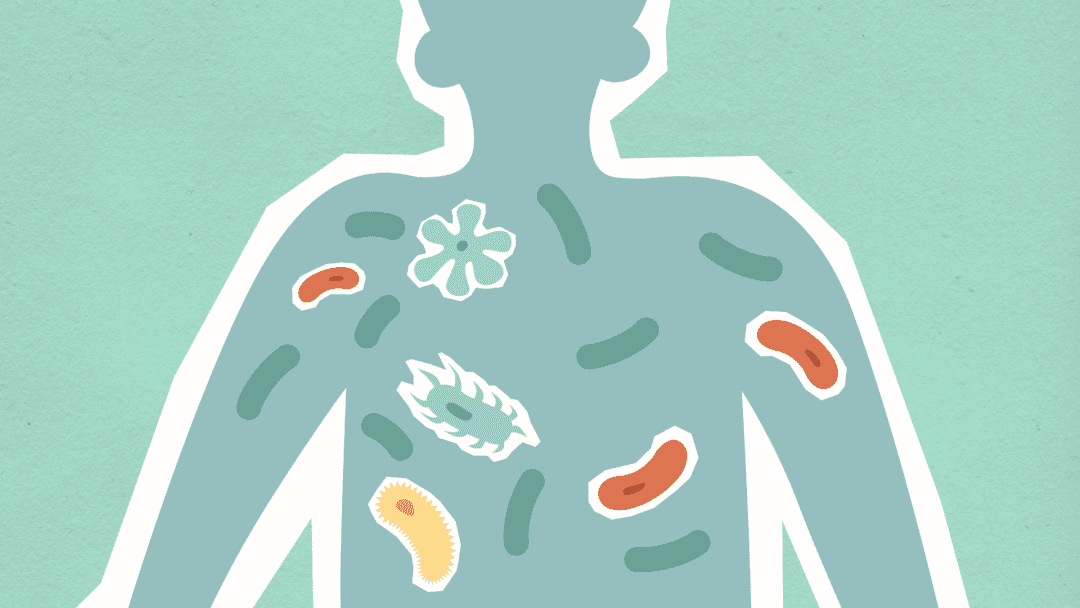Microbes: The Original Essential Worker

Microorganisms are all around us. On our skin, in our gut, and even on the ends of our hair – microorganisms make up a light coating of flora that is largely responsible for maintaining homeostasis. Collectively, the bacteria, viruses, fungi and protozoa in our bodies are called a microbiome. Everyone has a unique microbiome, almost like a personal fingerprint and the microbes that make up our microbiome are absolutely essential to our individual health.
This week we will take a look at two specific ways that microorganisms interact with their host: digestion and homeostasis.
Digestion
One of the most common interactions between humans and microorganisms is that of digestion. This is a mutually beneficial relationship: We provide the microbes with organic nutrients and shelter, while they break down our food into simple nutrient molecules that we can use for energy. Without these helpful little guys, we would find it difficult to digest many of the foods we eat on a daily basis.
The microbe family Lachnospiraceae (lach-no-spy-race-ee) is responsible for the breakdown of insoluble plant polysaccharides, which are indigestible by human enzymes. A recent study showed that only two species of these microbes were necessary to completely degrade all detectable insoluble plant polysaccharides found in common fruits and vegetables.
Many types of microorganisms also go to work on the organic nutrients within our gut, creating another important nutrient source for us: vitamins. Bacteria are responsible for nearly all of the body’s vitamin K production, while some species of yeast and fungi synthesize significant amounts of B-complex vitamins. Without the help of microbes, we would be unable to utilize many of the vitamins from the food we eat, which we need for cellular function.
Homeostasis
Homeostasis is the state of steady internal, physical, and chemical conditions maintained by an organism. It is the balance among all the systems in our body that we need to survive and function.
Defense
Pathogen defense and general immune system regulation is another job for which our body relies on microbial help. Our gut flora actually helps us defend against invading pathogens by stimulating the production of antibodies and other immune factors. Researchers have found that the presence of specific gut microbes are necessary to induce changes in intestinal cells, allowing for increased antibody production. This suggests that the microbiome helps maintain immunological homeostasis and suppresses excessive immune responses, such as those associated with autoimmune diseases like ulcerative colitis.
Intestine Health
Microbes also help to keep our gut healthy by regulating intestinal permeability, or “leaky gut”. A study done on germ-free mice showed that the absence of microorganisms in the gut caused a leaky intestinal barrier and increased systemic immune cell activity. This suggests that healthy bacterial populations are absolutely necessary for maintaining the permeability of intestinal tissues.
Mental Health
One of the most surprising findings in recent gut microbiome research is the role of these microorganisms’ in mental health. Numerous studies have “found a decrease in depressive and anxiety-like symptoms and behaviors resulting from the transplantation of healthy microbiota” through fecal transplant. This suggests that there are real chemical reactions taking place between our bodies and all those little microbes that live in our gut. Increasing the amount and variety of good bacteria in your microbiome appears to play a significant role in our health.
Patients with various psychiatric disorders including depression, bipolar disorder and schizophrenia have been shown to have significant differences in the composition of their gut microbiome. Enhancing beneficial bacteria in the gut, for example, through the use of probiotics, prebiotics, or dietary change, has the potential to improve mood and reduce anxiety in both healthy people and patient groups.” – Butler et al., 2019
Small Things Considered
Diversifying your gut microbiome with probiotic foods or probiotic supplements is a great way to improve overall health. We are continuously learning about the relationship between humans and the microbes in and around us – but one thing is for sure: microbes play an integral role in many processes essential to our health.

